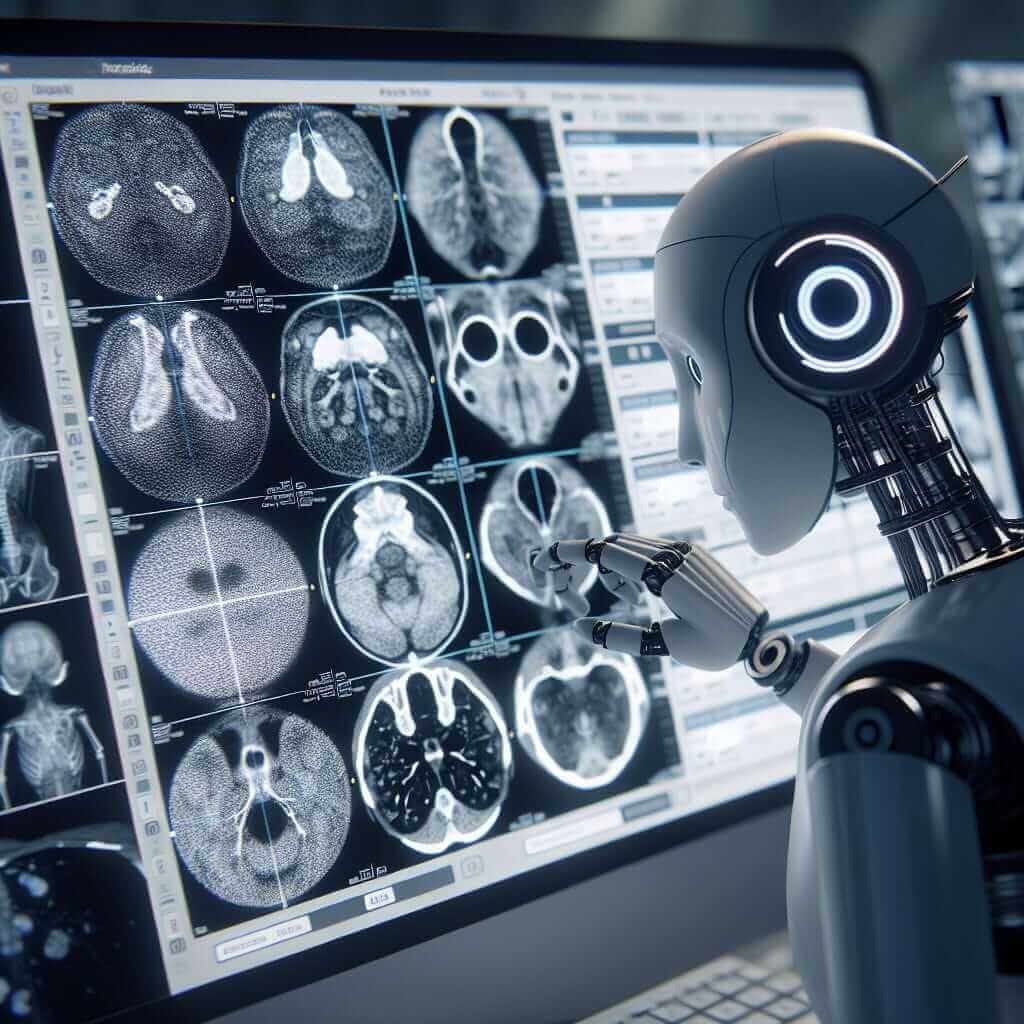The Reading section of the IELTS exam tests your ability to understand and interpret academic materials. With the rise of artificial intelligence (AI) in various sectors, “How is artificial intelligence transforming the healthcare industry?” has become a popular topic. This subject is highly relevant and has appeared multiple times in different variations in past IELTS exams. Given its importance and prevalence, it’s highly likely that you may encounter it in future exams as well.
Main Content
Full Reading Test: Medium Text
Passage Title: The Revolution of AI in Healthcare
Artificial intelligence (AI) is revolutionizing the healthcare industry in unprecedented ways. Over the last decade, advancements in machine learning, natural language processing, and robotics have significantly impacted various aspects of healthcare, from diagnostics to treatment and even administrative tasks.
Firstly, AI has improved diagnostic accuracy. Traditional diagnostic methods, though effective, can sometimes lead to misdiagnosis due to human error. AI algorithms, which are trained on extensive datasets, can analyze medical images, laboratory results, and patient history with remarkable precision. For instance, AI programs have been developed to detect early signs of diseases such as cancer and Alzheimer’s by analyzing medical images more accurately than human radiologists.

Moreover, treatment protocols have also benefited from AI. Personalized treatment plans are now possible due to predictive analytics. AI can analyze vast amounts of data from various sources, including medical research, patient records, and genetic information, to suggest customized treatment options for individual patients. This paradigm shift towards personalized treatment has shown promising results in fields like oncology and neurology.
AI’s influence extends to administrative tasks as well. Automated systems powered by AI handle patient scheduling, treatment documentation, and billing more efficiently, allowing healthcare providers to focus more on patient care. Natural language processing (NLP) algorithms are being utilized to sort medical records, extract relevant information, and even generate reports, thereby reducing the burden on medical staff.
Furthermore, AI-driven robotics is making surgical procedures safer and more precise. Robotic surgeries, guided by AI, minimize human errors and enhance surgical outcomes. These robots can perform intricate tasks with a high degree of accuracy, reducing recovery times and improving overall patient outcomes.
However, the integration of AI in healthcare is not without challenges. Concerns regarding data privacy, ethical implications, and the potential for job losses among healthcare staff are crucial issues that need to be addressed. Despite these challenges, the benefits of AI in healthcare are undeniable, promising a future where medical care is more efficient, accurate, and personalized.
Questions
Multiple Choice
-
What is the main advantage of AI in diagnostic procedures?
a. Increased speed of diagnosis
b. Improved diagnostic accuracy
c. Less involvement of human doctors
d. Reduced cost of diagnosis -
How does AI contribute to personalized treatment plans?
a. By storing patient data
b. By analyzing genetic and medical research data
c. By performing surgeries
d. By scheduling appointments
Identifying Information (True/False/Not Given)
- AI has eliminated the need for human radiologists.
- Robotic surgeries guided by AI result in quicker recovery times.
- The use of AI in administrative tasks has led to significant job losses in the healthcare industry.
Matching Information
-
Match the statements with the corresponding information from the text:
- AI improves diagnostic accuracy.
- AI handles patient scheduling and billing.
- AI makes surgical procedures safer and more precise.
a. Use of NLP algorithms
b. AI’s role in diagnostics
c. AI-driven robotics
Answers and Explanations
-
Answer: b. Improved diagnostic accuracy
- Explanation: AI algorithms analyze medical images and other data with more accuracy than human radiologists, enhancing diagnostic precision.
-
Answer: b. By analyzing genetic and medical research data
- Explanation: AI utilizes data from various sources to create tailored treatment plans, which is crucial for personalized medicine.
-
Answer: False
- Explanation: The text mentions that AI can analyze medical images more accurately but does not state that it has eliminated the need for human radiologists.
-
Answer: True
- Explanation: The passage states that robotic surgeries guided by AI reduce recovery times and improve outcomes.
-
Answer: Not Given
- Explanation: The text discusses the efficiency of AI in administrative tasks but does not provide specific information about job losses.
-
Answers:
- AI improves diagnostic accuracy. → b. AI’s role in diagnostics
- AI handles patient scheduling and billing. → a. Use of NLP algorithms
- AI makes surgical procedures safer and more precise. → c. AI-driven robotics
Common Mistakes
- Misinterpreting the inference questions: Ensure you understand what is explicitly stated versus what is implied.
- Overlooking key details that may change the meaning of the text.
Vocabulary
-
Unprecedented (adj) – (ʌnˈprɛsɪdəntɪd) – Never done or known before.
- Example: The use of AI in healthcare is unprecedented.
-
Paradigm (n) – (ˈpærədaɪm) – A typical example or pattern of something.
- Example: AI is changing the paradigm of personalized medicine.
-
Intricate (adj) – (ˈɪntrɪkət) – Very complicated or detailed.
- Example: Robotic surgeries can perform intricate tasks.
Grammar Point
Relative Clauses
- Definition: A relative clause provides additional information about a noun.
- Examples:
- “AI algorithms, which are trained on extensive datasets, can analyze medical images.”
- “Personalized treatment plans are now possible due to predictive analytics, which use vast amounts of data.”
Tips for High Reading Scores
- Practice Regularly: Consistent practice will improve your comprehension and speed.
- Manage Your Time: Allocate your time wisely during the exam.
- Understand Question Types: Familiarize yourself with different question formats.
- Focus on Keywords: Look for keywords in the questions and locate them in the text to find answers.
- Improve Vocabulary: Enhance your vocabulary to better understand complex texts.
With thoughtful preparation and consistent practice, you can achieve a high score in the Reading section of the IELTS exam. Good luck!